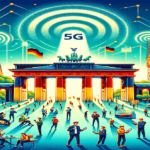In an era defined by rapid technological progress, innovations such as Artificial Intelligence (AI), Virtual Reality (VR), gene editing, blockchain, and nanotechnology are transforming our daily lives. These breakthroughs, extending beyond research labs and corporate strategies, are pivotal in areas like communication, work, privacy, consumer behavior, and information access.
1. Transforming Communication:
Technological advancements have revolutionized how we connect. Instant messaging, video calls, and social media have become integral, bridging distances in real-time. AI-powered translation breaks language barriers, enhancing global connectivity and fostering cultural exchange. This digital interconnectedness enriches personal and professional relationships, knitting a tighter global fabric.
2. Revolutionizing Work with AI:
AI is redefining the workplace by automating tasks and amplifying human skills. Through predictive analytics and intelligent automation, it boosts efficiency across sectors. AI is not just altering existing jobs but also carving out new niches in data science, machine learning, and robotics. It’s steering work culture towards creativity and analytical thinking, marking a significant shift in employment paradigms.
3. Privacy Concerns:
The flip side of digital convenience is the erosion of privacy. The extensive data collection and its analysis by AI pose significant privacy dilemmas. The debate around ethical use, surveillance, and data sharing underscores the need for a balanced approach to technology, prioritizing individual rights alongside innovation.
4. Redefining Shopping:
E-commerce, empowered by AI and augmented reality, offers a personalized and immersive shopping experience. From AI-curated recommendations to AR ‘try-before-you-buy’ features, technology is making shopping more intuitive and secure, thanks to blockchain’s transparency in transactions.
5. Enhancing Information Access:
The digital age has democratized information, making knowledge accessible with a few clicks. AI-driven tools streamline the search for information, facilitating learning and keeping individuals informed. This accessibility is pivotal in bridging knowledge gaps and fostering a well-informed society.
Embracing the Future Responsibly
As we stand at the crossroads of a technological revolution, the impact of these innovations will deepen. They offer profound benefits in communication, work efficiency, and access to information, yet pose challenges in privacy and ethics. Navigating this landscape demands a responsible approach to technology adoption, ensuring it serves to enhance human experiences without compromising core values. The future hinges on our ability to harness these advancements thoughtfully, shaping a world where technology amplifies the best of humanity.The
















